Diablo 3 beta hands on
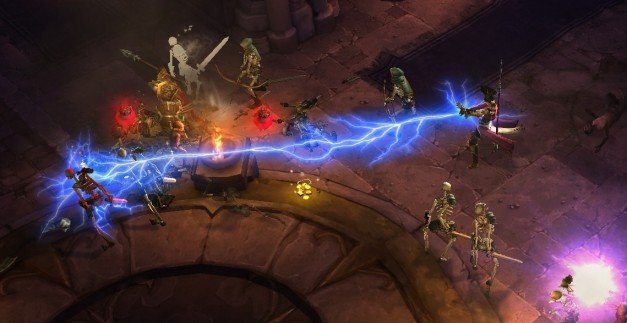
Diablo 3 is turning out to be a very different game to the one we expected. You can buy and sell in-game items for real money , it's now online only , and a new skill system means you never make any permanent decisions about the way your character develops. When the beta launches shortly - we don't know exactly when yet - a select group of fans will discover something else: it's superb.
I got to play it for around five hours at Blizzard last week, spending some time with all five classes and experimenting with the crazy new level up system. The beta does feature an auction house, but not one where you can spend or earn real money, so we don't know yet how that element will play out. But this first chunk of the game itself, a quest to kill Skeleton King Leoric, gives a great sense of how all five classes play and evolve.
The Quest
You start on the outskirts of New Tristram, a town that's been painstakingly rebuilt from the- oh, it's ruined again. A meteor crashed into its cathedral, and now the dead are getting back out of their graves. Including a guy we last killed back in Diablo 1: King Leoric.
The look of this opening section is a gloomy watercolour, muddy grass smudged around wrinkled tree stumps and cracked headstones. Dead things crawl out of every dark hole, limping, bleeding and vomiting. You butcher them in their dozens, the action crisp and bloody against the soft-focus graveyards and killing fields.
There's something very old fashioned about the way Diablo 3 looks: it's beautiful, and the technology is doing clever things to give the world this painterly look, but it's the last game you'd put on a screen at E3 to demonstrate 'next-gen' graphics. Characters are small, and crisply defined - it's a very PC vibe.
You're led through the story in a more controlled and logical way this time: dialogue is brief, but each task always leads you to the next, and often the characters involved in it will come with you to help out. Your own character is surprisingly talkative this time, agreeing to people's pleas on your behalf, and even chiding people for their attitudes - my Wizard managed to call the town mayor a coward within five minutes of arrival.
The combat is the point of it all, of course, but there's no sense talking about it in general terms. Each class is a different game, and it's one of the few RPGs that makes me want to play every one.
The biggest gaming news, reviews and hardware deals
Keep up to date with the most important stories and the best deals, as picked by the PC Gamer team.
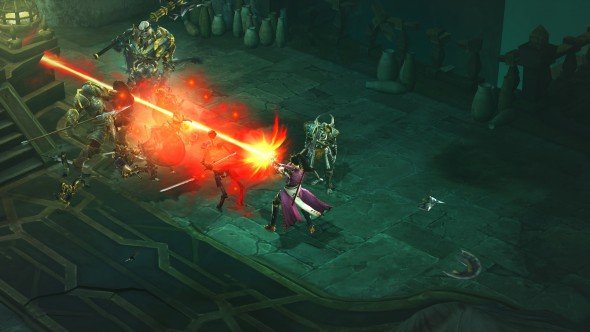
The Wizard
I started with the Wizard, a class which gives you two main strengths. One, you're a crackling storm of damage, a hose of blistering arcane energy, a cruel wind of frost and fire. Two, you are called a Wizard even if you are a girl .
To be a spellcaster in Diablo 1 and 2 was to spend every spare point on mana regeneration skills, and single-handedly prop up the local potion industry. When you start as a Wizard in Diablo 3, it's hard to deplete your mana. Some spells can be cast continuously without overwhelming your ferociously fast natural regen rate.
You start the game with two skill slots, and two skills to fill them: right click spits off a modest Magic Missile, and hitting 1 emits a Frost Nova that freezes all nearby enemies solid. It's seconds before your first level up, though, and that's when the interesting decisions start.
The new skill system for Diablo 3 was devised by Blizzard to solve problems with the more traditional level-up system that they found during internal alpha testing. You earn a completely new skill every time you level up, but you don't choose which one. Instead, you choose which skills to 'equip' in your skill slots at any given time. You're stuck with two of them until level 6, and even that early on, the number of ways to pick two skills from the six you have access to are somewhat mind-boggling.
It's like an RPG in which you can redesign your character freely at any time. You're never committing to a particular build, and each new skill you unlock gives you new ideas for how to use the ones you've shelved.
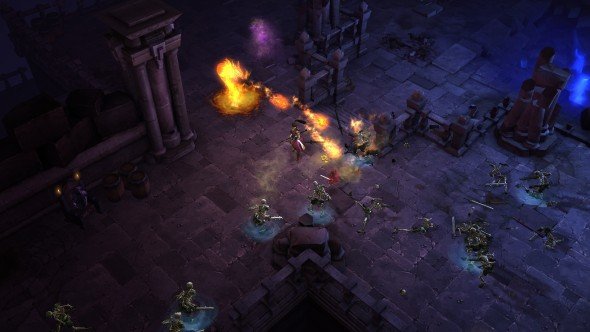
I liked Frost Nova, a lot. But the Magic Missile didn't have much punch, so I gladly benched it for a Charged Bolt spell that sends a series of shocks along random paths towards nearby enemies. By the time I earned a third skill slot, I had Electrocute: an enormously satisfying chain-lightning spell, and another area of effect spell that knocked enemies back.
Frankly, it wasn't as good as Frost Nova. But a few fights in, I realised it didn't need to be. Electrocute and Charged Bolt scratched the same Emperor Palpatine itch, so I shelved the earlier skill and took both Frost Nova and Knockback. Neither skill drains any mana at all: they operate on independent cooldowns of about 10 seconds each. Having both equiped let me disrupt huge mobs of enemies twice as often as I could before.
I became pretty fixated on splash damage and crowd control with the Wizard: Diablo 3 isn't a game about carefully soloing an infected bear in the way certain MMOs are. Every fight is a blood-soaked last stand against gurgling hordes of unthinkables. So I specialised in throwing myself into the middle of them, freezing them solid, then flinging a powerful chain of splash damage spells at the resulting cluster of ice sculptures before they can defrost and disperse.
The Wizard's movements aren't the usual pseudomystic roleplaying handwibble: she pulls these forces from an invisible place, and flings them like they weigh something. It gives combos like this an electric violence that never stops feeling good.
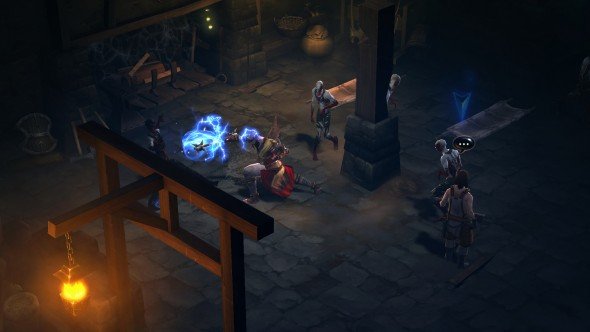
The Monk
Early on at least, the Wizard feels like the most powerful class. But she's not the best. The best is the Monk.
The Monk isn't the passive healer archetype his name might suggest: he's a martial arts fighter whose physical attacks are copied and boosted by magical forces that follow his movements. One of his core skills, Deadly Reach, is a three-stage series of melee moves that are exaggerated by currents of an unseen force. A short fist jab sends a long spiked ripple through the air, an elbow bash causes a rolling shockwave that barrels well beyond your physical form, and a final kick hits everything within a metre of your thrusting foot.
Like most classes in Diablo 3, his mana-like resource, Spirit, generates quickly enough to use a skill like Deadly Reach as your primary attack. You can assign skills to either mouse button, so I kept Reach as my left-click, and a teleport skill on the right. I'd zip into the fray, shred whole crowds of enemies with my extendo-punching, then zap back out if my health ever threatened to drop.
The unusual short-range damage vectors of the Monk's fighting style get you thinking carefully about where to stand relative to your enemies, how to filter them into neat queues that can be executed with a single sharp thrust. Attack animations snap his limbs from poise to strike in sudden and inhuman jerks, a stop-motion monster of cruel directed force.
I ended up combining my Deadly Reach / Teleport combo with a healing spell that let me keep my Witch Doctor friend and his pets alive. The beta is weirdly easy: even the final boss didn't require any strategy to defeat him, so my heals were less about keeping us alive and more about moving onto the next fight a bit quicker.
The extremely low difficulty will be a problem if it doesn't change: there's no way to increase it until you've completed the whole game, and Blizzard tell me they're not planning on one. You can start the game again on Nightmare once you've finished on Normal, but that's a whole new world. As in previous Diablo games, it's not a fresh start: you carry your high-level character over to a tougher version of the same world.
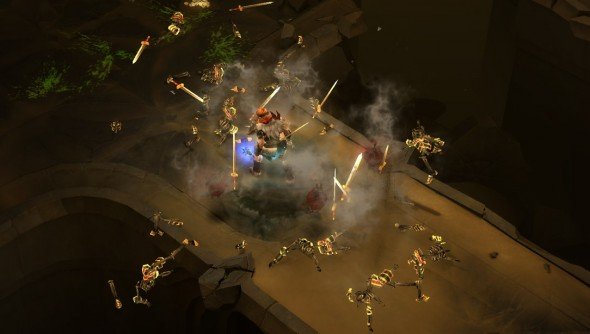
The Barbarian
I played all five classes, but only finished the beta with the Monk and the Wizard. Of the rest, the Barbarian was the biggest surprise: I half expected to find him boring, but he quickly became my favourite of the three.
He's a brutal ball of bunched muscle, splitting and smashing enemies with short, sharp blows. His resource, Fury, refills enthusiastically with every hit you make or take. That means Bash, a skill that multiplies your weapon damage and sends enemies flying, can be your standard left-click attack. And should be - it's hilarious.
Knockback is spectacular: zombies are sent twirling through the air, limp limbs spinning, until they smack some pillar of scenery and crunch to the ground. In a crowd, doing that to half the enemies and hitting the rest hard enough to make them explode, the Barbarian gives melee its own slapstick magic.
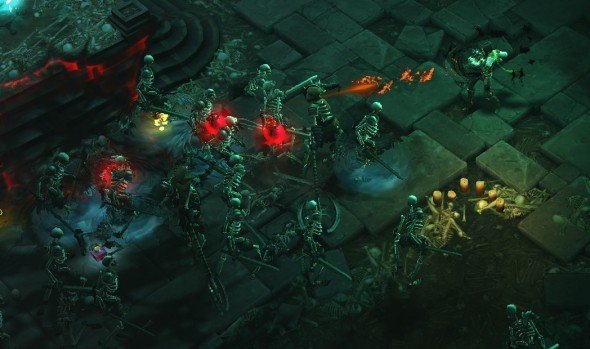
The Demon Hunter
The Demon Hunter has an interesting split resource system: Hatred is required for special attacks and regenerates rapidly, while Discipline is drained by defensive abilities and returns more slowly.
I settled into using Evasive Shot as my basic attack: as well as doing more damage, it causes you to automatically backflip if you fire when an enemy is close. The shots drain Hatred, easily recoverable, and the skill only drains Discipline if the backflip happens. I'd twirl out of combat with the first few shots, then play more cautiously until I had the Discipline to do it again. It means you're always looking at your angles of retreat - the backflip is useless if you're up against a wall.
I didn't get far enough with the Demon Hunter for the class to really make sense: she was more vulnerable than the Wizard, but couldn't pump out damage and stun effects as rapidly. Tim and Graham played it more at previous events, and apparently her bouncing grenades skill adds a lot.
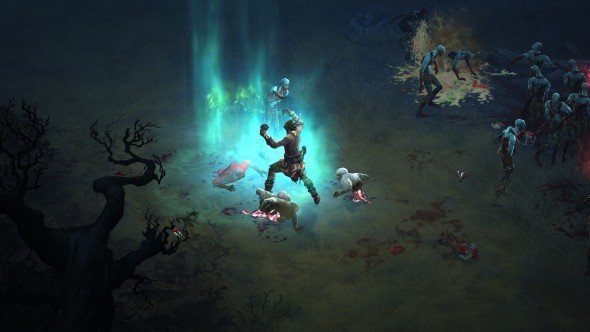
The Witch Doctor
The Witch Doctor was more immediately fun. I knew he had pets, but I hadn't quite realised how many, and how many of his skills make animals happen. I was firing of squads of exploding frogs to join my zombie dogs, while pigmies danced around turning enemies into chickens, and pin-legged spiders stalked between them. It's basically a class that fires a zoo.
There are also some interesting direct attacks to play around with while your pretties do unthinkable things to people. A poison blow dart lets you snipe bosses, Grasping Dead slows crowds with subterranean zombie gropes, and I can cast a curse that spreads like a virus if the enemy dies before he can shake it.
Later, beyond the levels I had access to, it gets better. One skill summons a zombie from the earth, behind which another emerges and climbs on his shoulders, behind which another emerges and climbs on their shoulders, until you have an undead human tower. Then, it falls on people. There's no fancy attack, it just keels forwards and slams down on whatever's in front of it.
Thoughts
There's a lot of offputting stuff going on with Diablo 3 at the moment. I don't agree with Blizzard's idea that Diablo should be an online-only game, or that it's all about trading. I thought I was going to disagree with the skill system too: it means you no longer make any permanent choices about your character, which was a key part of Diablo for me.
In practise, though, I found the new system didn't remove interesting decisions - it added them. It kept all the excitement of new possibilities, highly individualised builds that kill in ingenious new ways. All it removed was the fear of permanently screwing yourself by mis-spending a point. That does remove the tension and hand-wringing over how to level up, but I didn't miss it.
Even without finding any skill runes to customise these abilities, the ways you can combine them into unique setups for each class are just mind-boggling. You don't choose a skill when you level up, but you do choose a build, and that's like picking every skill all over again. It's a more creative process, not less.
The classes themselves are each so different and satisfying to play. I can't think of another RPG where I've had this much trouble deciding which one to play first: I've narrowed it down to the Wizard, the Monk, the Witch Doctor or the Barbarian.
I don't welcome the auction house, but I trust myself to ignore it on my first play through. After hearing all this news and playing the game with the new skill system, I left more excited about Diablo 3 than when I arrived.

